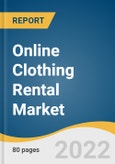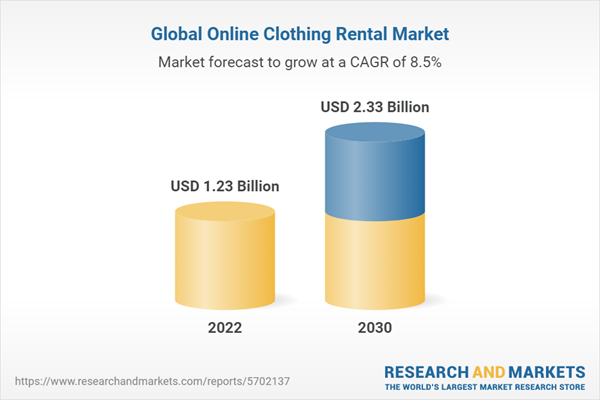Increasing online retail is the primary driving factor for this growth. Moreover, technological advancements, internet penetration, and the increasing popularity of online shopping portals during the last few years are the factors driving the market. Furthermore, the rise in the popularity of fashion vlogs, the film industry, and the television industry is expected to fuel market growth. These industries require clothes for a short duration and thus, they prefer renting them instead of buying them. Hence, this growth is expected to impact demand for online clothing rental in the forthcoming years.
Another element supporting the market's expansion is growing awareness of environmentally friendly clothes and the benefits of sharing and recycling clothing. Reusing worn clothing, using less plastic packaging, and efficiently making use of recyclable, renewable, manufacturing resources like power, water, and other materials are just a few examples of the sustainability practices that are becoming more and more popular, which is helping the industry to expand.
Online clothing rental services also allow brand- and price-conscious consumers to try on a range of clothes without buying them, as there is a growing emphasis on sharing rather than owning. It is anticipated that further variables, such as expanding internet penetration rates, rising subscription-based model acceptance, and growing disposable income levels, will fuel the market.
COVID-19 has negatively impacted the online clothing rental market. As a result of the lockdown, all businesses, except essential services, were closed which disrupted the supply and distribution of online clothing thereby affecting the clothing manufacturers. For instance, in the U.S. in response to the pandemic, Rent the Runway, the face of the fashion rental model, announced layoffs, temporary pay reductions, and staff furloughs.
Another significant issue during the pandemic is hygiene. Clear health and safety guidelines are essential, particularly when it comes to peer-to-peer networks like Hurr, where lenders send garments directly to renters. However, the market is expected to eventually return to the pre-pandemic situation as people resume their normal life and start attending weddings, banquets, and other events after a long gap. This trend is anticipated to impact positively during the forecast period.
The women segment led the market share in 2021 and is expected to witness progressive growth in demand during the forecasted period. The women segment accounted for the leading market share of more than 59.13% in 2021 and is expected to witness significant growth in the near future. Constantly changing fashion trends are anticipated to propel segment growth.
Traditional renting is expected to register a CAGR of more than 8.7% during the forecast period. Traditional clothes are worn during festivals along with rare and special occasions thus, are used very less. Hence, consumers prefer renting them instead of purchasing them. Formal clothes are anticipated to hold the largest market share of around 46.17% in 2021. Formal clothes such as suits and blazers are expensive and require maintenance, thus price-conscious and young consumers find renting as a better option.
In 2021, North America led with a market share of around 39.13% and is anticipated to witness a significant CAGR in the near future. In North America, Mexico contributes to the majority of the share and is expected to register a CAGR of more than 8.1% during the forecast period. Europe is the second-largest segment with a market share of around 26.91% in 2021. Western Europe is the dominant segment, due to the high purchasing power and fashion-conscious consumers in the countries, such as France, Italy, and the U.K.
The market poses a moderate to low entry barrier as this industry is new. Hence, to expand the business further, many new companies are joining the market. The overall market is driven by product innovation and introduction of the advanced features to enhance the consumer experience.
Online Clothing Rental Market Report Highlights
- The women’s segment is expected to grow at the fastest CAGR during the forecast period, from 2022 to 2030. The segment growth can be attributed to the constantly changing fashion trends which are anticipated to propel segment growth
- The traditional segment is expected to grow at the fastest CAGR during the forecast period., Traditional clothes are worn during festivals along with rare and special occasions thus, it is anticipated to propel the segment growth
- North America led with a market share of around 39.13% and is anticipated to witness a significant CAGR, during the near future. In North America, Mexico contributes to the majority of the share and is expected to register a CAGR of more than 8.1% during the forecast period.
Table of Contents
Companies Mentioned
- The Clothing Rental
- Rent the Runway
- Flyrobe.Com
- Share Wardrobe
- Secoo Holdings Limited
- Gwynnie Bee
- Le Tote
- Swapdom
- Style Lend
- Dress Hire
Table Information
| Report Attribute | Details |
|---|---|
| No. of Pages | 80 |
| Published | November 2022 |
| Forecast Period | 2022 - 2030 |
| Estimated Market Value ( USD | $ 1.23 Billion |
| Forecasted Market Value ( USD | $ 2.33 Billion |
| Compound Annual Growth Rate | 8.5% |
| Regions Covered | Global |
| No. of Companies Mentioned | 10 |









